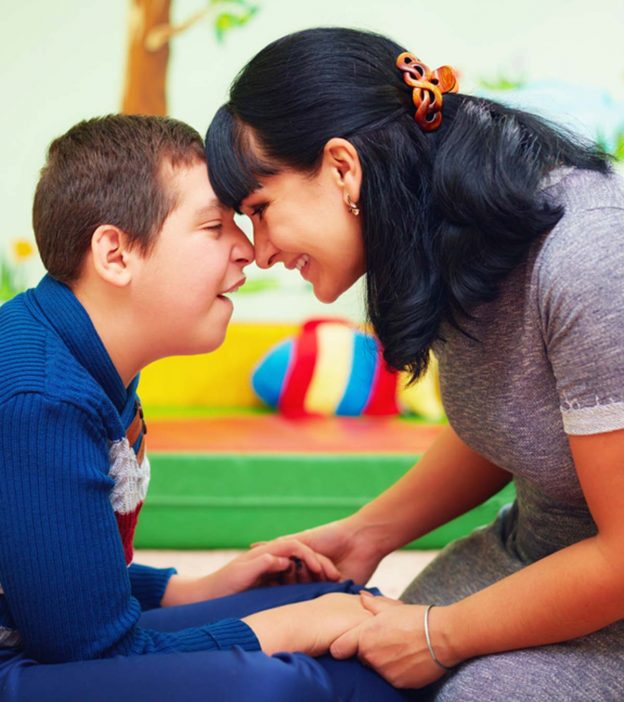
Image: Shutterstock
In their own way, every child is unique and special. However, some may require extra help to navigate their everyday activities. Parenting children with special needs may require extra effort as they need help to tide over a medical condition, a pre-existing disease or syndrome, a learning disability, or an emotional issue.
Compared to children without special needs, these children face specific challenges that may require additional assistance in school and at home. Keep reading this post to learn more about the special needs children may have and for some tips to help you better address their needs.
Types Of Special Needs Children
Children with special needs are categorized into four main types (1) (2).
1. Physical
Special needs children with physical disabilities face problems performing regular body movements and coordinating activities. Some common examples of physical issues in these children include muscular dystrophyiXA group of inherited diseases characterized by progressive weakness and degeneration of the skeletal muscles. , epilepsyiXA neurological disorder characterized by recurrent seizures. , cerebral palsyiXA group of neurological disorders that affect movement and coordination caused by damage to the brain. , and multiple sclerosisiXAn autoimmune disease causing damage to the brain, spinal cord, and optic nerves. . These physical issues can be caused due to genetics, spinal cord injury, brain damage due to trauma, or any serious illness. Children with physical problems often require special health care support.
2. Developmental
Children with developmental needs could have any of these conditions: Down’s Syndrome, Fragile X syndromeiXA genetic disease causing developmental delays and physical disabilities in children. (FXS), autism, dyslexia, dyscalculia, dysgraphia, dyspraxiaiXA developmental disorder that affects a child's ability to plan, organize, and execute movements. , aphasia or dysphasiaiXA disorder that affects a child’s ability to speak and understand language. , auditory processing disorder, or visual processing disorder.
Most developmental disabilities in children usually begin before a child is born, while a few can begin during their growing years, caused by an illness, infection, or trauma. In most cases, the developmental needs may arise due to a mix of factors, including genetics, parental health during pregnancy, complications during birth, and exposure to environmental toxins.
3. Behavioral/emotional
Image: Shutterstock
Children with emotional or behavioral needs usually have attention deficit disorder (ADD)iXA neurodevelopmental disorder affecting the child's ability to pay attention, control impulses. , bipolar disorder, or oppositional defiant disorderiXA behavioral disorder in children characterized by disobedience to authority. and may show the following characteristics.
- Difficulty in communicating with others
- Inability to maintain personal relationships
- Loneliness or depression
- Hyperactivity or impulsive nature
- Signs of emotional instability
- Short temper and irritability
4. Sensory impaired
These children have sensory impairments that affect one or more of their senses, including vision, hearing, smell, touch, or spatial awarenessiXBeing conscious of your surroundings and where you are in relation to them. . There can be many reasons for sensory impairments in children, the most common being injury and infection. In most cases, genetics and environmental factors are responsible. Children with this disability may have difficulty receiving and responding to information.
Do All Special Needs Children Require The Same Assistance?
Although all special needs children require extra care and help, their needs may vary. While some may be born with a disorder or disability, others may develop a disability after their birth and during their growing years.
Based on the specific need, each special needs child requires specific assistance to achieve their physical, academic, emotional, and developmental milestones.
Early intervention is helpful in most cases (3). For example, if a child with hearing impairment is evaluated early and provided proper treatment, it drastically improves the child’s chances of hearing, and they might not need much assistance later in life.
However, in the case of a special needs child with cerebral palsy, they will require long-term help and assistance and even throughout their life. So, although all special needs children require assistance, their needs may differ.
How To Address The Needs Of Special Children?
Parenting a special needs child can be challenging, and sometimes, it can take a toll on your mental and physical health. Here are a few things that you can consider to make things easier for you and your child (4).
1. Have a strong support system
Image: Shutterstock
In your endeavor to provide the best support to your child, you may forget to take care of yourself. And sometimes, you could feel you are alone. But, the truth is, there are other parents who are going through the same situation.
Connecting with other parents of children with disabilities can help you establish a strong support system for yourself and your child. This can go a long way in keeping yourself mentally strong and emotionally stable, which in turn could help you give your best for your child.
2. Do not hesitate to ask for help
No matter how well you know your child, there are times when you may be confused and frustrated too. Ask for help! There is nothing wrong with asking for help or more information and guidance on making life better for your child.
Speak with your
- Child’s pediatrician for any queries regarding your child’s health or other specialists when required.
- Child’s teacher about how you can help your child in their academics.
- Friends and family and seek them to relax, unwind and calm your mind.
3. Nurture sibling relationships
If your special needs child has siblings, your job might seem harder as you try to give your best to each child. It is common for the siblings to feel ignored as your special needs child demands more care and attention. Make sure you reinforce sibling bonds and your bond with each child by giving them undivided attention, participating in each child’s daily activities, and performing activities involving each child. Try to build a team culture at home, so all your children know they are one family.
4. Give yourself some “me time”
Image: Shutterstock
In your quest to be a good parent to your child, do not forget yourself. Giving yourself me-time allows you to recharge your batteries. Here are some ways you can pamper yourself:
- Take some time out every day to do what gives you mental peace. Do not compromise on this time.
- Take up an activity that helps you relax, whether it is making a simple cup of coffee or indulging in a hobby.
- Mingle with other children with special needs and their parents. A change of environment can work wonders. Meeting new people and indulging in activities that involve others in similar situations can be fun and refreshing for you and your child.
- Get your daily dose of exercise or workout. This can help improve your physical and mental health.
5. Protect your relationship with your spouse/partner
Partners or spouses co-parenting a special needs child often tend to devote their entire time and energy to their child that they forget to give each other time. This can be detrimental to the relationship in the long run. Good communication, empathy, time-offs, spending time together, and being compassionate to each other are some ways to make sure your relationship with your partner gets stronger and does not go downhill. Try to spend time together by enlisting help of grandparents, extended family or if possible babysitters for much needed breaks in form of coffee dates or dinners.
Frequently Asked Questions
1. What challenges may I face as a parent to a child with special needs?
Parents of children with disabilities may often experience many challenges, such as an increased financial burden to support the child, increased stress, lower quality of life, feeling frustrated or isolated, and physical and mental health issues (5). Learning about the child’s condition, identifying effective treatment and resources, and dedicating innumerable hours to meeting therapists, teachers, doctors, and advocates are some other challenges you may face (6).
2. How do I raise a child with special needs?
Raising a child with special needs can be challenging as the special needs are added to the usual parental responsibilities. Learning all about the child’s condition, encouraging independence, engaging with the child’s teachers and school, and getting them involved in different play and activities are some ways you can support your child with special needs. You should consider joining a local or an online support group for your mental health.
Parenting a child with special needs can bring along several challenges. It might require you to learn and unlearn a lot of things. Your needs may vary based on your child’s. A robust support system can help you a lot. Do not hesitate to ask for help. Caring for a child with special needs can take a toll on your and your family’s mental health. Consider seeking help from a certified therapist or local and online support group of parents of children with similar conditions.
Key Pointers
- Special needs children can have physical limitations, emotional needs, behavioral issues, developmental difficulties, and sensory impairments.
- The requirement of assistance may vary for each child with a disability, depending on the severity and type of disability.
- Asking for help, a strong support system, self-care, nurturing siblings relationships, and sharing responsibility can help the parents address their child’s special needs.
References:
2. Facts About Developmental Disabilities; Centers for Disease Control and Prevention
3. Children with Special Needs, Special Needs Planning
4. Survival Tips for Special Needs Parents; The Center for Parenting Education
5. Matthew Joseph Russell, et al.; Use of family disability service by families with young children with disabilities; Developmental Medicine & Child Neurology
6. Parenting Children with Special Needs; Boston Univesity


















